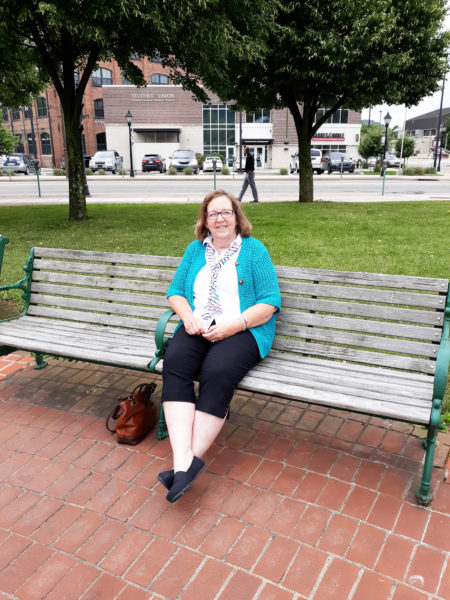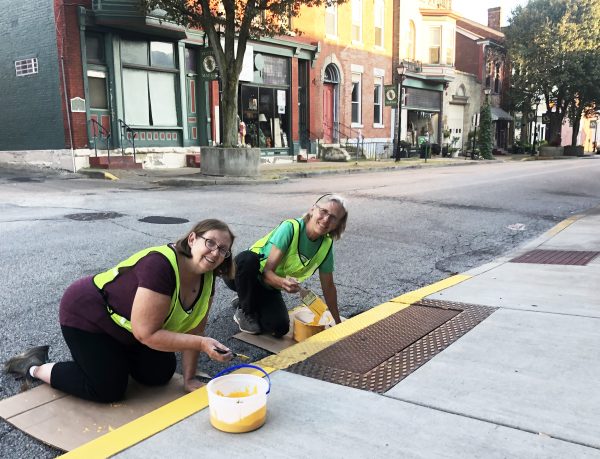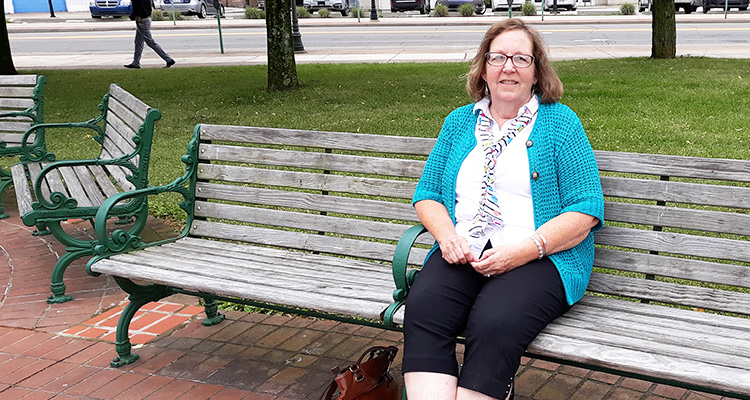Editor’s note: Our series, Working Our Way Back to You, will profile Ohio Valley natives who have left town but returned to the community that created them. In today’s story, writer Phil Gable introduces us to Ellen Gano.
What would it take for you to leave this town? What would call you back?If you were born here, played in the street here, partied here, went to school here … what would it take to leave all that behind?
 Maybe it’s that people are drawn to where they belong. This theory would account for why so many young adults leave town, only to eventually return.
Maybe it’s that people are drawn to where they belong. This theory would account for why so many young adults leave town, only to eventually return.
That young adult, identity still budding, begins to see once-familiar faces as foreign and inscrutable. Your friends are all doing it — they’re getting out. Maybe all you really need is one good friend to pull you out beyond the city limits, someone to tug you across state lines.
But then, years later, you look around one day and realize that your environment seems somehow unfamiliar again. Or maybe it’s not that the city you’ve made a life in is unfamiliar — it’s just that a deeper music, a more primal magic is beckoning. Maybe it’s not even familiar faces, but familiar trees. Or a plunking banjo.
Such was the case for Ellen Welty Gano, a Wheeling native and driving force behind the Downtown Wheeling Volunteer Meet-Up. Gano told me of that one time when she and her husband were out there in the hills by Oglebay … eh, but I’m getting ahead of myself. We should start at the beginning.
IN THE BEGINNING
Fond recollections of a valley childhood come easily for Gano, who describes growing up in the Oakmont section of town as being “very freeing.” For her, there were always “neighbors and friends and things to do.” There in the 16th Street Barnes and Noble, I watch as her eyes light up as she thinks back to those years. “It was a different time from the perspective that things were relatively safe.”
The thing of it is, Gano wanted more. “From a really young age, I was into communications, advertising,” she muses. “I just thought there were better opportunities out there … I really felt like I needed to experience something bigger.” All she needed was a good push, a partner in crime to tip the scales. And so, sure enough, “a friend and I promised ourselves … when we graduate, let’s go to a big city.”
Even then, as a youngster, the objective was clear. “When I went away for college, I knew I wasn’t coming back.”

College towns are a curious liminal space. They’re one part staging ground, one part professional purgatory, one part waiting room of the world. West Virginia University was this place for Gano, who brainstormed and dreamed big with a sorority sister. Gano was pursuing her bachelor’s degree in journalism from WVU, so when she graduated in 1979, Atlanta seemed like a good fit. The initial launch was short-lived, however. As she tells it, “I wanted to go to Atlanta … then I missed my now-husband enough that I came back to Morgantown.”
Moving to the big city would have to wait, but in the meantime, a smaller city would do the trick. Gano found one of the biggest public relations and advertising firms in Charleston, West Virginia, and began working there as an account executive. In five years, she would move to Washington, D.C.
FOCUSED GOALS, BROADENING PERSPECTIVES
When you ask Gano about ultimately what called her away and kept her in D.C. for so long, she describes diversity to be a key motivator. For example, Gano recounted her initial big city experience in Atlanta as being “much more racially diverse.”
Other types of variety also manifested themselves. Looking back, Gano observes that “the numbers alone bring more opportunities.” It stands to reason — a bigger population equates to more jobs and more variety in professional options. Says Gano, “I recognized that the world outside of Wheeling was much more diverse … functionally more diverse.”
In the field of public relations and advertising, these unique professional opportunities began to matter more for Gano, who realized that “hardcore selling is not as comfortable to me.” For her, genuineness in marketing and PR “must come from something — believing in and setting up your messaging points … why do you want this to happen?”
And so, in 1986, when a job opened up as a marketing specialist with the Bureau of Engraving and Printing in Washington, D.C., Gano went for it.
The move marked the beginning of a fulfilling career that would span 30 years in our nation’s capital. Gano’s initial role in account services opened up the chance for her to work on “the creative side” of the agency. As she tells it, “I really started as a marketing specialist.” However, Gano was just getting started.
Over time, she grew into a role as supervisory public affairs specialist, and her big city exposure to the diversity of human experience continued. In particular, Gano recounts a challenging problem that arose for the Bureau of Engraving: how do blind individuals recognize differences in currency? The task fell to her to communicate the bureau’s solutions for problem.
Gano developed a variety of skills over the course of her career, many of which followed a central theme. “What’s the objective?” she asks. (This question comes up in our conversation several times.) The question is clarifying, and it’s one that Gano reports “has really crossed over into other areas of life.” She adds, “In that world of communication, I learned how important it is to drill down on that message.”
Even in a creative workspace, asking this question has the effect of filtering out distractors and white noise. Gano recounts frequently asking, “What are your objectives, goals, mission?” and reflected that doing so “made your mind focus on what was important.”
As it turned out, a retirement in the D.C. metropolitan area was not to be. Life has a way of clarifying things like goals and objectives. Gano and her husband had already been asking themselves, “Where do we retire?” when her father died, and “the house that my dad grew up in … came open.” They began to consider what a move back to the valley might look like.
Then one evening, a fateful conversation happened. “We were in Wheeling one weekend visiting Oglebay, and it was fall,” Gano recalls. “It was gorgeous!” And then her hubby observes, “You know, I think I could live in Wheeling. …” Ellen agreed, and shortly afterward, the opportunity to buy her father’s childhood home opened up. It was meant to be.
THE RETURN
In looking back, Gano notes that Wheeling “hasn’t lost its feeling of home.” In addition to the foliage, regional bluegrass musical influences played a role: “I would hear that music, and it would speak to me about my heritage.
“I think that there are things inside of me … that sense of where you came from that had every sense of feeling safe as a kid,” she observes.
Nevertheless, after returning to town, she was confronted with another challenging realization: “I didn’t know anyone.” Gano came to realize that “at this point, I have met and talked with more of my parents’ friends, than my own.” While acknowledging that having her brother, John Welty, living nearby took the edge off — “he and his wife have been a big part of our lives” — something had to be done about the gnawing “sense of loneliness” she felt in her hometown. What does one do to meet people around here?
Gano leaned into the problem, full tilt. “I wanted to get engaged in something here.” Even though some of her previous volunteerism efforts in D.C. had not panned out, she kept pressing. Then one day Gano recounts having a very fortunate conversation with Jake Dougherty, who then put her in touch with Alex Weld of Wheeling Heritage.
Gano recalls explaining that she had a “desire to do things to help Wheeling.” This desire coalesced into a couple of very distinct objectives — a drive to “see if we can do something with the vacant store front windows” and a weekly meet-up at Heritage Port to “weed, pick-up and prune.” Downtown project, meet Ellen Gano, the project manager.

The budding community forming around the volunteer meet-up is something that Gano is passionate about. “I know that there are a lot of people out there like me,” she observes. “We’re doing it now every Thursday from 7-8 p.m. … just cleaning up.” For her, inclusion is key, and all ages are welcome. “We even had a woman who brought her granddaughter down.” There is the sense that there is something bigger in play — the cultivation of community.
If her excitement for the city is any indicator, Gano is only just getting started. When asked about what makes Wheeling unique, Gano observes, “I know what it used to be.” Having arrived on the scene in retirement, she nevertheless brings 30 years of experience in project management, marketing and PR to the table, yet still occupies a position of complete professional freedom: “This is much more enjoyable than getting some kind of job and feeling — trapped is the wrong word — confined.” For Gano, volunteerism allows her the autonomy to go as big or as little as she wants.
Working her way back. Asking herself, “what’s the objective” has led her here. Where loneliness threatened, Gano leveraged her professional capabilities to build community. The skills that drew her away are the ones that brought her home.
And that is how Gano worked her way back to you.
• Phil Gable is a psychologist, veteran and Army Reservist with a history of one deployment to Afghanistan. Despite growing up in Kennesaw, Georgia, he likes to think of himself as having “married into” the Ohio Valley where his wife grew up. He is a graduate of Georgia Institute of Technology, Georgia State University and Fuller Theological Seminary, where he completed his doctor of philosophy in clinical psychology. When not shamelessly navel-gazing or sipping bourbon, he likes to pursue hobbies such as writing, reading and running. Phil considers Wheeling the perfect place to do all of these things, and can occasionally be found hiding out in the comic book section of the library downtown.


